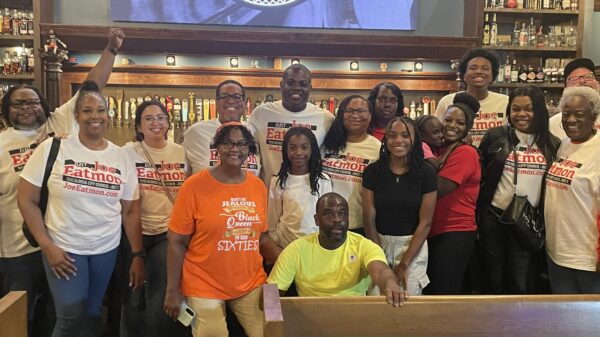The direct message on Twitter came from a familiar name, which made the contents a bit more unsettling.
My cousin, Payton, was writing to let me know that in the midst of the COVID-19 pandemic, he had all the symptoms — fever, a cough, achy all over. And he had been in and out of medical facilities where he could have contracted the virus.
He wanted advice, having read a few of my tweets citing information from medical professionals around the state. What should he do?
I forwarded him the number to the Alabama Department of Public Health’s helpline, and I told him to let me know what happened.
What transpired is both an infuriating example of Alabama’s — and the country’s — lack of preparation for this pandemic, and a sad example of how even suspecting that you’ve contracted this virus can have devastating effects on your income, your life and your future.
The reason Payton contacted me — and the reason I simply forwarded him a phone number — was because he developed his symptoms on a Friday evening, about 10 days ago. His primary physician was shut down for the weekend and he wanted advice on whether to try to go to a hospital ER or just stay at home and away from people.
The voice on the other end of the helpline asked some questions and ultimately told Payton to just stay home and go see his doc on Monday morning.
On Monday, March 16, he and his girlfriend were two of several to be tested for coronavirus at DCH Regional Medical Center in Tuscaloosa. By that time, the hospital was already out of swabs to collect samples, so they were asked to spit in cups and told the results would be available in the next 3-5 days.
They were provided with access to a patient portal and told that they would be contacted if they were positive for the virus. If not, check the website after three days and look for their negative test results.
However, after discussions with their doctors, there was a general consensus that they likely had a relatively mild case of the virus.
At that point, they decided the right thing to do was to alert their employers and self-isolate at their home. In a matter of hours, Payton’s girlfriend had lost both of her jobs — a contract teaching position and a part-time waitressing gig — and was, understandably, in a panic.
In the meantime, Payton was told he couldn’t come in but there would be no paid time off for dealing with the virus. Instead, he’d have to burn through his limited paid-time-off days until they were used up. And then, well, hopefully, Congress will come up with something.
A couple days later, Payton sent me a message saying he still didn’t know if he was positive for the virus, although he still felt like absolute hell. He’s a pretty smart guy, college grad and all, and he couldn’t manage to access the DCH patient portal.
After hours of trying, he contacted the facility and was finally told that the portal was down.
Ah, well, no one had called either Payton or his girlfriend, so they were probably fine — just a bad cold or some sort of upper-respiratory infection.
And then, Thursday night, Tuscaloosa Mayor Walt Maddox revealed that more than half of the samples collected by DCH were “spoiled.” Some of samples had become too warm on transport and couldn’t be tested. Others didn’t have enough sputum in the cups to perform the test.
That, of course, included the tests of Payton and his girlfriend.
So, Friday morning, they loaded up in the car and drove to the Church of the Highlands’ drive-up testing location in Birmingham and waited hours to get a redo. This time they were swabbed and provided more info on where to check their results.
And by Tuesday morning, the 11th day after he first contacted ADPH and informed someone that he had symptoms of the coronavirus — and eight days after being tested — Payton and his girlfriend still don’t have test results.
He still feels miserable. She has mostly recovered.
They are still without income because they’ve been treating this as if they have the virus — because that’s the responsible way to behave — and so they cannot go to work. They are hopeful for negative test results someday soon that they can show to their employers and possibly start back to work. (Payton asked that I not use his last name, and his girlfriend asked that I not use her name at all, out of fear that their employers would see their names and not allow them to return to work.)
Their story is just one of many. And there are certainly others who didn’t face such complications or mistakes or dramatic life shifts.
But many, many Americans — from all walks of life — are facing similar hardships. Overnight, they developed a fever and a cough and their entire worlds turned upside-down. Or they didn’t even develop symptoms and their steady jobs vanished in a profession that lost millions of jobs overnight, leaving them out of work with near-zero short-term options for a new line of work.
There is a lot of skepticism among many of the comfortable people about the need for dramatic assistance and drastic measures to help bring an end to this pandemic. I guess, maybe, it’s hard to imagine your life crumbling before you — going from steady work and a happy home to sleepless nights and trying to scramble to make sure the kids are fed and the lights stay on — if you’re not the one going through it.
But it’s happening all around you. To people you love and respect. To people who would rather eat dirt than accept a handout. To people who are good and decent.
The country was ill-prepared for this pandemic, despite plenty of warning. The state of Alabama didn’t do any better.
The least we could do now is try to make things a little less catastrophic for our struggling neighbors, family and friends.





















































